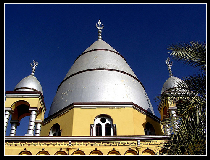Being the largest country in Africa with a rich culture reflecting a loose association of hundreds of tribes, Sudan is a continent in microcosm. Customs and traditions are as diverse and extreme as the country’s climate which ranges from barren deserts in the north to lush rain forests in the south. The people are united in using Arabic as a common language but their cuisine is a blend of the many backgrounds and ethnic groups as well as the foreigners who influenced the country’s history.
Ramadan is eagerly awaited in Sudan and preparations begin weeks in advance and rise to a fever pitch in the last few days before the month begins. Apart from prayers, religious classes and open-air Iftaar parties, works of charity, alms and other voluntary fund-raisings are common during the month. Life is completely transformed in the country over 30 million where Muslims are the overwhelming majority.
The tradition of hospitality is as important in Sudan as it is in other Arab countries but it is especially prominent during Ramadan. The concern and respect shown to a guest is no greater anywhere and communal Iftaar is still widely observed throughout the country. People prefer to take their sunset meals outside in open grounds. The male population of a neighborhood or village assembles in a designated location — usually outside the home of the eldest person or the tribal chief — for Iftaar and to perform congregational Maghreb prayers.
If someone in the neighborhood dies, the neighbors, relatives and friends of the bereaved family bring food and take their Iftaar meals where people gather to offer condolences. Condolences are usually offered for three days.
This tradition of open-air Iftaar is deeply rooted in the society and according to some elders, it was originally intended to attract travelers and other guests who happened to be passing at sunset. “In the past people traveled by camel and donkey; some were small traders carrying their goods from one place to another, others were travelers going to visit families and relatives. It helped bring village people together,” said 73-year-old Khalifa Al-Faki.
Unfortunately, the tradition is slowly dying out in big cities. “People have become more and more self-centered. Nowadays, everyone is living in a villa or flat and are confined to their homes. Even the type of food people eat during Ramadan is no longer the same; traditional dishes are giving way to foreign food,” lamented Al-Faki.
Ramadan has its own special dishes and some of these are found in virtually every household. A Sudanese meal is seldom free of meat with the country being very rich in animal wealth and a major livestock exporter. The favorite meats remain lamb and chicken with fish (Nile perch) very common among city dwellers. The most common dishes are mulah waika (cooked dry okra) and mulah rob (curdled milk) taken with kisra (omelet-like pancake made of millet or sorghum). The way kisra is prepared differs from one place to another with people in the western part of the country preferring porridge over the thin layers of kisra common in the north. There is also salatet zabadi (cucumber/yogurt salad), shorbet adas (lentil soup) and kofta (ground meatballs).
Unlike Asian cuisine, Sudanese cooking is usually simple with few spices added. Salt, pepper and lemon are the main seasonings. The meal is considered incomplete without shatta — a hot spicy condiment made of crushed red pepper with lemon juice and garlic; it is served with every meal.
Some families serve mahshi (stuffed tomato/cucumber with chopped meat) during Ramadan but this is not common. In the northern provinces, people prefer gurrasa (thick pancake of wheat flour) taken with mulah bamya made of okra lamb stew.
There may be several dishes at the meal but usually no forks and knives are used although spoons are provided. Meals are usually eaten from a common bowl, especially in the case of kisra, porridge and gurrasa.
A very common Ramadan soft drink is abreh which may be either red or white. This is a slightly sweetened, refreshing drink made of thin flakes of sorghum flour. Other drinks include lemonade and fruit juice with guava, grapefruit, orange and mango available in abundance throughout the country. Because of the hot weather, abreh is served throughout the year.
The Iftaar meal would not be complete without tea and coffee. Usually loose tea is used and is infused until it is a deep red. Cinnamon is then added. The Sudanese have their very distinct way of preparing coffee — and this gave the country some of its fame. Known locally as jabana, coffee is prepared by first frying the beans in a special pot over charcoal and then grinding them with cloves and certain spices. The coffee is boiled in hot water and served in tiny cups from a small clay kettle known as aljabana. It is from this word that the process of drinking coffee took its name.


 Home
Home Discover Islam
Discover Islam Quran Recitations
Quran Recitations Lectures
Lectures
 Fatwa
Fatwa Articles
Articles Fiqh
Fiqh E-Books
E-Books Boys & Girls
Boys & Girls  Articles
Articles










